Blog > The Role of Full Stack Development in E-commerce
The Role of Full Stack Development in E-commerce
June 30th, 2023
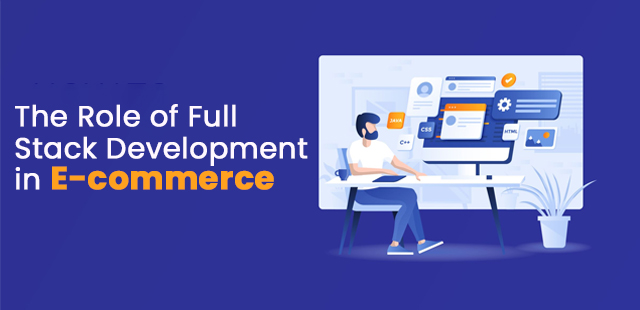
Table of Contents
The Role of Full Stack Development in E-commerce
Significance of Full Stack Development in E-Commerce
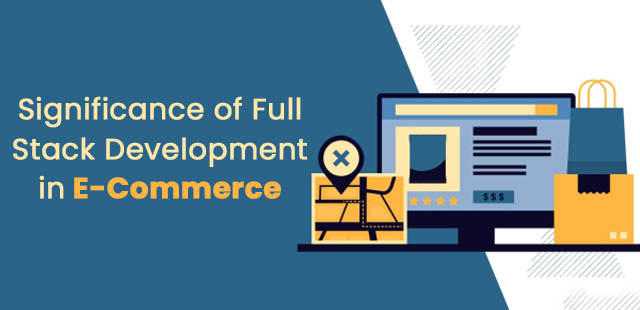 Full stack developers contribute significantly to the success of a website and app through:
Full stack developers contribute significantly to the success of a website and app through:
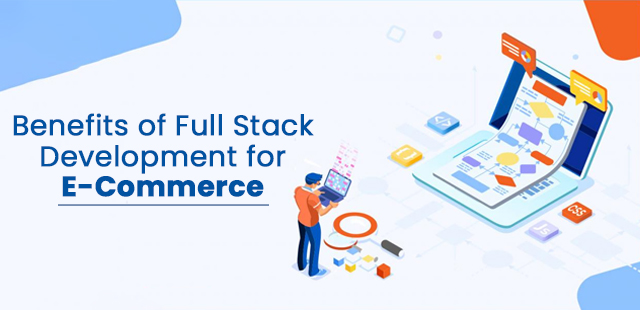 When it comes to e-commerce projects, full stack developers can add a lot of value. Some of the reasons why e-commerce giants prefer hiring full stack developers are:
Time and cost efficiency: Because a single developer can handle both front-end and back-end responsibilities, the dependency on multiple developers is reduced. This leads to quicker iterations, more effective development processes, and cost savings for businesses.
Flexibility and Agility: Full stack developers are adaptable and capable of switching between various tasks with ease. This flexibility allows them to respond to changing project needs, implement modifications efficiently, and iterate swiftly.
Improved Collaboration: A full-stack developer has a comprehensive understanding of the entire development process, enabling them to collaborate effectively with designers, project managers, and other stakeholders. This facilitates more effective communication, reduces misunderstandings, and fosters a collaborative development environment.
Troubleshooting and Bug Fixing: Since a full-stack developer has an overview of the entire application, it is easier for them to identify and fix bugs or issues. As a result, problems are resolved more quickly, and the e-commerce platform runs more smoothly.
When it comes to e-commerce projects, full stack developers can add a lot of value. Some of the reasons why e-commerce giants prefer hiring full stack developers are:
Time and cost efficiency: Because a single developer can handle both front-end and back-end responsibilities, the dependency on multiple developers is reduced. This leads to quicker iterations, more effective development processes, and cost savings for businesses.
Flexibility and Agility: Full stack developers are adaptable and capable of switching between various tasks with ease. This flexibility allows them to respond to changing project needs, implement modifications efficiently, and iterate swiftly.
Improved Collaboration: A full-stack developer has a comprehensive understanding of the entire development process, enabling them to collaborate effectively with designers, project managers, and other stakeholders. This facilitates more effective communication, reduces misunderstandings, and fosters a collaborative development environment.
Troubleshooting and Bug Fixing: Since a full-stack developer has an overview of the entire application, it is easier for them to identify and fix bugs or issues. As a result, problems are resolved more quickly, and the e-commerce platform runs more smoothly.
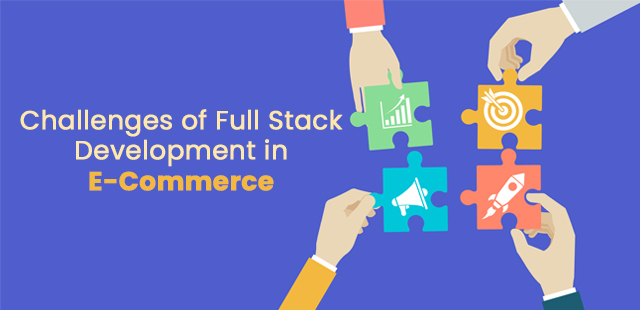 Despite all the benefits that full stack development brings to the table, there are certain challenges that e-commerce companies need to work around. These include:
Despite all the benefits that full stack development brings to the table, there are certain challenges that e-commerce companies need to work around. These include:
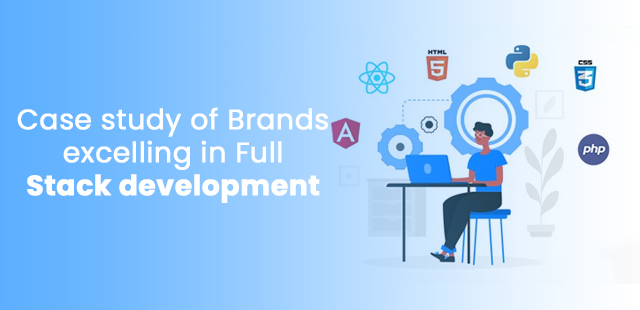 Here are some of the major brands that are succeeding in full stack development:
Here are some of the major brands that are succeeding in full stack development:
- Seamless User Experience
- Effective Database Management
- Integration With Third-Party Services
- Customization and Scalability
- Front-End Development
- Back-End Development
- Controlling Versions
- Configuration of the Server
- Application Programming Interfaces (APIs)
- Authorisation and Authentication
- Best Security Practices
- Debugging and Testing
- Communication and Soft Skills
- Complexity and Skill Requirements
- Security Concerns
- Integration With Third-Party Services
- Performance Optimization
- What is the role of full stack development?
- What is full-stack eCommerce?
- What are the benefits of learning full stack development?
- Which software is best for eCommerce website development?
- How do I create a full stack eCommerce website?
Significance of Full Stack Development in E-Commerce:
 Full stack developers contribute significantly to the success of a website and app through:
Full stack developers contribute significantly to the success of a website and app through:
1. Seamless User Experience
Full stack development is key in designing intuitive user interfaces that enhance the shopping experience. Developers can create visually appealing and user-friendly interfaces by leveraging front-end technologies such as HTML, CSS, and JavaScript.2. Effective Database Management
When done right, full stack development ensures efficient handling of data storage, retrieval, and manipulation, optimising performance, security, and integration across front-end, back-end, and database systems.3. Integration With Third-Party Services
This involves seamlessly connecting and incorporating external software or platforms into an existing system, expanding functionality, and enhancing user experience through shared data and resources.4. Customization and Scalability
With the help of full stack development, customised e-commerce solutions can be created tailored to all the specific needs and requirements of business. With full control over both front-end and back-end development, developers can create scalable architectures that can handle growing user traffic and evolving business needs.Key Skills of Full Stack Development in E-Commerce
Here are significant skills you will learn in a full stack web development course that will help you build e-commerce sites:1. Front-End Development
By learning from the best full stack developer course, you will master the essential elements of web programming, such as HTML, CSS, and JavaScript, to structure, style, and interact with information. Also, it enables you to create websites that adapt to different screen sizes and devices.2. Back-End Development
This course enables you to learn a server-side language such as Node.js, Python, Ruby, or PHP to handle server logic. Also, you will effectively connect with databases such as MySQL, PostgreSQL, and MongoDB to store, retrieve, and manage data efficiently.3. Controlling Versions
The best full stack developer course will make you skilled in using version control to track code changes, interact with other developers, and manage multiple project versions.4. Configuration of the Server
The best full stack developer course will train you to configure and manage servers, whether standard configurations like Apache, Nginx, or cloud platforms like AWS Heroku.5. Application Programming Interfaces (APIs)
By following a full stack web development course, you will discover how to construct and utilise APIs, enabling your apps to interface with external services and resources.6. Authorisation and Authentication
A full stack web development course helps you understand how to implement secure login systems using OAuth or JWT (JSON Web Tokens) and establish user roles to control access to specified features or resources.7. Best Security Practices
With a full stack web development course, you will understand and apply steps to protect online applications against common vulnerabilities.8. Debugging and Testing
This course will help you understand how to write and run unit tests to ensure the dependability of your code. For effective troubleshooting, master debugging tools and techniques.9. Communication and Soft Skills
You will learn to develop practical communication skills for interacting with other developers, designers, and stakeholders. This course will help you develop effective project management skills for smooth workflow and delivery. Read More : How to Become a Full Stack Developer: Required Skills and ResponsibilitiesBenefits of Full Stack Development for E-Commerce
 When it comes to e-commerce projects, full stack developers can add a lot of value. Some of the reasons why e-commerce giants prefer hiring full stack developers are:
Time and cost efficiency: Because a single developer can handle both front-end and back-end responsibilities, the dependency on multiple developers is reduced. This leads to quicker iterations, more effective development processes, and cost savings for businesses.
Flexibility and Agility: Full stack developers are adaptable and capable of switching between various tasks with ease. This flexibility allows them to respond to changing project needs, implement modifications efficiently, and iterate swiftly.
Improved Collaboration: A full-stack developer has a comprehensive understanding of the entire development process, enabling them to collaborate effectively with designers, project managers, and other stakeholders. This facilitates more effective communication, reduces misunderstandings, and fosters a collaborative development environment.
Troubleshooting and Bug Fixing: Since a full-stack developer has an overview of the entire application, it is easier for them to identify and fix bugs or issues. As a result, problems are resolved more quickly, and the e-commerce platform runs more smoothly.
When it comes to e-commerce projects, full stack developers can add a lot of value. Some of the reasons why e-commerce giants prefer hiring full stack developers are:
Time and cost efficiency: Because a single developer can handle both front-end and back-end responsibilities, the dependency on multiple developers is reduced. This leads to quicker iterations, more effective development processes, and cost savings for businesses.
Flexibility and Agility: Full stack developers are adaptable and capable of switching between various tasks with ease. This flexibility allows them to respond to changing project needs, implement modifications efficiently, and iterate swiftly.
Improved Collaboration: A full-stack developer has a comprehensive understanding of the entire development process, enabling them to collaborate effectively with designers, project managers, and other stakeholders. This facilitates more effective communication, reduces misunderstandings, and fosters a collaborative development environment.
Troubleshooting and Bug Fixing: Since a full-stack developer has an overview of the entire application, it is easier for them to identify and fix bugs or issues. As a result, problems are resolved more quickly, and the e-commerce platform runs more smoothly.
Challenges of Full Stack Development in E-Commerce:
 Despite all the benefits that full stack development brings to the table, there are certain challenges that e-commerce companies need to work around. These include:
Despite all the benefits that full stack development brings to the table, there are certain challenges that e-commerce companies need to work around. These include:
1. Complexity and Skill Requirements
A diverse skill set and extensive knowledge across different technologies is required while developing a full stack. That’s why the developer must master multiple programming languages, frameworks, databases and server configurations.2. Security Concerns
The platforms of E-commerce process customers’ personal and payment information. As a best practice, Full stack developers must prioritise security measures including secure authentication, data encryption, and protection against common vulnerabilities such as cross-site scripting and SQL injection.3. Integration With Third-Party Services
E-commerce platforms require integration with payment gateways, shipping providers inventory management systems and other third-party services. While integrating these services, Full stack developers must ensure data consistency and smooth functionality.4. Performance Optimization
To retain customers and increase conversions, E-commerce platforms must provide a fast and responsive experience. Full stack developers need to optimize the performance of applications, minimize the page loading time, implement caching mechanisms, and manage server resources efficiently.Case study of Brands excelling in Full Stack development
 Here are some of the major brands that are succeeding in full stack development:
Here are some of the major brands that are succeeding in full stack development:






Add a Comment